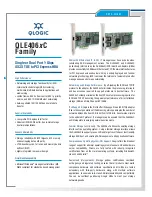
S e n d d o c u m e n t a t i o n c o m m e n t s t o m d s f e e d b a c k - d o c @ c i s c o . c o m
33-10
Cisco MDS 9000 Family CLI Configuration Guide
OL-16184-01, Cisco MDS SAN-OS Release 3.x
Chapter 33 Configuring IPv4 and IPv6 Access Control Lists
Applying an IP-ACL to an Interface
Figure 33-1
Denying Traffic on the Inbound Interface
The
access-group
option controls access to an interface. Each interface can only be associated with one
IP-ACL per direction. The ingress direction can have a different IP-ACL than the egress direction. The
IP-ACL becomes active when applied to the interface.
Tip
Create all conditions in an IP-ACL before applying it to the interface.
Caution
If you apply an IP-ACL to an interface before creating it, all packets in that interface are dropped because
the IP-ACL is empty.
The terms
in, out, source
, and
destination
are used as referenced by the switch:
•
In—Traffic that arrives at the interface and goes through the switch; the source is where it
transmitted from and the destination is where it is transmitted to (on the other side of the router).
Tip
The IP-ACL applied to the interface for the ingress traffic affects both local and remote traffic.
•
Out—Traffic that has already been through the switch and is leaving the interface; the source is
where it transmitted from and the destination is where it is transmitted to.
Tip
The IP-ACL applied to the interface for the egress traffic only affects local traffic.
To
apply an IPv4-ACL to an interface, follow these steps:
traffic
source
Switch 1
Switch 2
Switch 3
traffic
destination
M0
M1
120711
Command
Purpose
Step 1
switch#
config t
Enters configuration mode.
Step 2
switch(config)#
interface mgmt0
switch(config-if)#
Configures a management interface
(mgmt0).
Step 3
switch(config-if)#
ip access-group restrict_mgmt
Applies an IPv4-ACL called
restrict_mgmt for both the ingress and
egress traffic (default).
switch(config-if)#
no
ip access-group NotRequired
Removes the IPv4-ACL called
NotRequired.















































